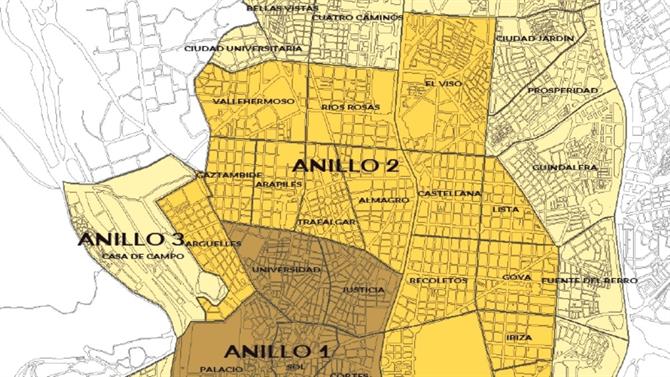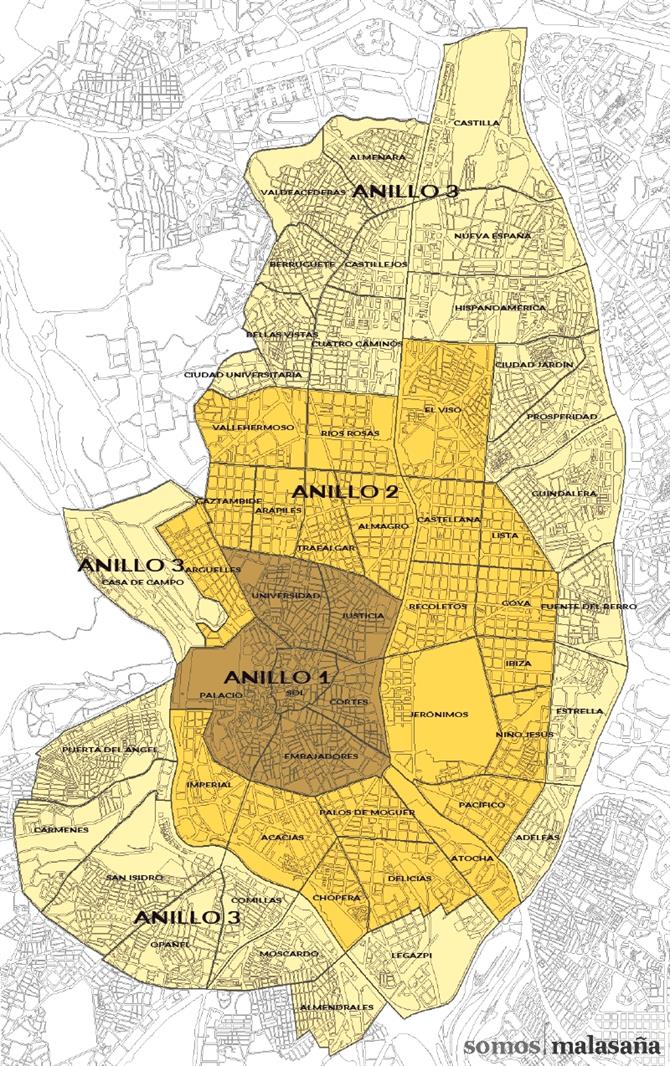- The objective of the new regulation is to preserve residential use in the centre of Madrid and extend the accommodation to other areas of the city.
- The regulation of the holiday rental licencing laws in Madrid establishes three “tourist zones” according to the degree of saturation of tourist accommodation in each “barrio” (neighbourhood).
- Neither this plan nor the moratorium (suspension of issuing licences) impacts on when owners rent their main residence for less than three months a year.
On 20th August 2018, the new regulations creating “tourist zones” in Madrid with restrictions on holiday rentals according to the area where the property is located, the uses of the property and its level of protection, was published.

Detail of territorial scope of the PEH, divided into three concentric rings.
There now follows a period when the public can comment/complain to the Ayuntamiento about the proposed regulation amendment prior to the final version of the amendment being drafted and legally ratified. Until the deadline to formulate allegations is over and the City Council submits its restrictions for final approval, the moratorium on the granting of licenses remains in effect. During this time, main residence properties can be rented out for period of less than 90 days per year.
The initial approval of the Special Plan for the regulation of the use of Tertiary Services in the Hospitality (PEH - Plan Especial para la regulación del uso de Servicios Terciarios en la clase Hospedaje), agreed by the Governing Board of the city on July 26 and published 20th August 2018 in the Official Gazette (Boletin) of the Community of Madrid, foresees the implementation of restrictions on this activity in ELEVEN districts of the city.
The municipal regulation determines that a house that is rented for more than three months a year must obtain a holiday rental licence.
The regulation, aims to "preserve residential use in the urban centre, preventing the conversion of the city centre’s housing into temporary accommodation exclusively for tourists", while seeks to expand the accommodation to other areas of the city, "redistributing economic activity and unloading the concentration of the historic centre."
The marketing watchdog CNMC - National Commission of Markets and Competition has appealed against the new regulation.
Affected neighbourhoods
The regulation will be applied to an area of the city that is divided into three concentric rings, each classified as a different levels of "saturation" of tourist accommodation: -
- The first ring coincides with the boundaries of the downtown district.
- The second comprises the entire Chamberí district and part of the districts of Chamartín, Salamanca, Retiro, Arganzuela and Moncloa-Aravaca.
- The third expands to neighbourhoods of the previous districts, to which are added other zones of the districts of Tetuán, Usera, Carabanchel and Latina.

The rest of the municipality of Madrid will not be affected by the new regulation of the City Council.
Invididual properties
In Zones 1 and 2, all holiday rental properties must have independent access to the accommodation separate from the entrance to other residential properties. This, in effect, means that only ground floor properties, or possibly 1st floor properties in mixed commercial/residential buildings are permitted to be rented out as holiday lets. Communal entrance ways, portals or elevators common to other houses cannot be used.
In addition, this access cannot go directly from the street to the accommodation but must have a reception or similar area.
This condition is mainly oriented to those accommodations located at street level.
In Zone 3, in buildings for exclusive residential use (so not mixed commercial/residential buildings with shops on the ground floor), all new holiday rental licences will only be granted to properties with independent access.
However, a fundamental difference in Zone 3 compared with Zones 1 and 2, is that in mixed commercial/residential buildings with offices or shops, then property owners applying for a holiday rental licence do NOT need to meet the requirement relating to independent access to the holiday rental property.
Entire buildings offering holiday rentals
In order to convert an entire apartment block into holiday rental properties, or a hotel, the owner must present a special plan that studies the impact on the environment and is subject to the approval of the Government Board of the city and then the municipal Plenary.
If the building has already authorized a tertiary use (other than residential), the current General Plan allows holiday rental licences to be granted to any properties, except those that are classified as “protected” which require special consideration.
